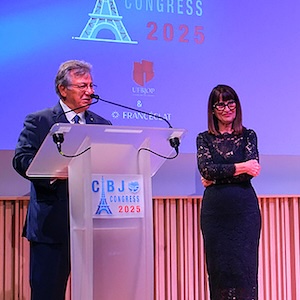
Botswana president Mokgweetsi Masisi, who turned his country’s negotiations with De Beers into a protracted and sometimes bitter public spectacle, has lost his bid for reelection.
This marked the first-ever defeat for the Botswana Democratic Party, which has ruled the country since it declared independence in 1966. Masisi had been Botswana’s president since 2018, and was vice president from 2014 to 2018.
His successor is Duma Boko, 54, leader of the Umbrella of Democratic Change, an alliance of left-leaning opposition parties founded in 2012. A native of Botswana, Boko graduated from Harvard Law School in 1993 and served as a human rights lawyer and academic before entering politics.
One key campaign issue was Botswana’s economy, which has suffered due to the growing popularity of lab-grown diamonds. Sales at Debswana, the joint venture between the government and De Beers, dropped 50% during the first nine months of the year.
“Botswana is broke,” local newspaper Sunday Standard wrote recently.
While Botswana has long been a major player in the diamond industry, Masisi was the nation’s first president—as well as the first head of state from anywhere—to appear at the JCK show in Las Vegas, which he did in both 2019 and 2024. He called the visits part of a larger campaign to give Botswana a higher profile in the industry.
In mid-2023, after a long standoff that included three extensions of the prior contract, Botswana and De Beers signed an agreement in principle for a new 10-year deal. Its most noteworthy provision called for the state-owned Okavango Diamond Company to sell 50% of the country’s diamond production by the end of the contract’s time frame. (It currently sells 25%.)
A few months later, the two parties signed a “head of terms,” which was billed as a major milestone toward a final deal. In Las Vegas in June 2024, Masisi told JCK he expected a contract with De Beers would be signed by July.
Yet there is still no final contract—one year after the head of terms was signed—and it is not clear how the change in Botswana’s leadership will affect negotiations. It’s also not clear what what it will mean for Masisi’s plan, also not yet formalized, to acquire a percentage of diamond manufacturer HB Antwerp.
The website for Boko, the new president, doesn’t seem to include many comments on diamonds or De Beers. In 2018, Boko criticized De Beers’ decision to launch its lab-grown brand, Lightbox (which Masisi criticized as well).
“De Beers has entered into the synthetic diamonds market,” Boko said at the time. “What does that do? Botswana thinks it has rough diamonds, and we are negotiating with De Beers. But De Beers says, ‘I don’t need you. I can go and penetrate the synthetic diamond market.’”
A De Beers spokesperson tells JCK via email: “The partnership between De Beers and Botswana is one of the most successful and longstanding public-private partnerships in the world. Our partnership with the people of Botswana is a great source of pride for De Beers Group, and we will continue to work with Botswana’s government in support of shared objectives, as we always have.”
On X, Masisi conceded defeat and graciously congratulated his successor.
“I want to congratulate you and wish you the best,” he told Boko in an audio clip posted on X. “You can count on me to provide whatever guidance you want.… We will retreat to being a loyal opposition and work with you for the betterment of our country.”
Masisi also posted: “Together, let us uphold the values of peace and ensure a smooth and seamless transition. This moment is a testament to our commitment to democracy and the strength of our nation.”
Top: Mokgweetsi Masisi at the JCK show this year (Photo by Camilla Sjodin)
- Subscribe to the JCK News Daily
- Subscribe to the JCK Special Report
- Follow JCK on Instagram: @jckmagazine
- Follow JCK on X: @jckmagazine
- Follow JCK on Facebook: @jckmagazine






